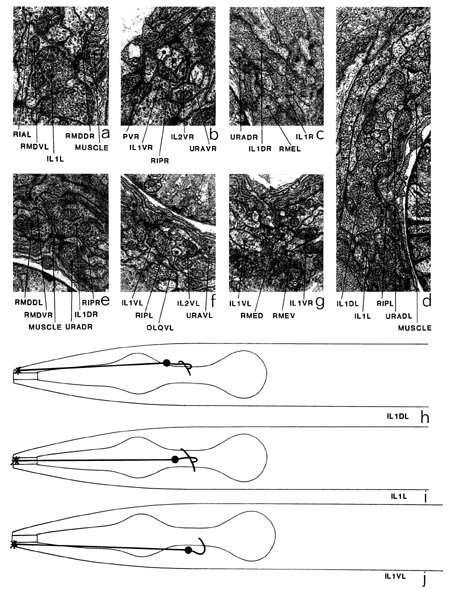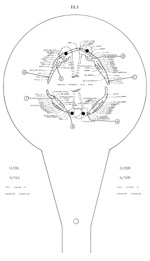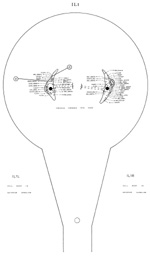 Click pictures for higher resolution images Click pictures for higher resolution images
IL1 is a set of six ciliated neurons with striated rootlets, each of which is one of the two
component neurons of the inner labial sensilla. Unlike IL2, the IL1 dendrite does not protrude
through the hole in the socket cell to the outside. Processes of IL1 run posteriorly from the
sensilla in each of the six labial process bundles. They run into their cell bodies, which are
anterior to the ring; posteriorly directed processes from the cell bodies rejoin the process
bundles, which pass down outside the ring, turn, and then run anteriorly near the inside of
the ring (b) until the processes disperse in the anterior regions of the neuropile. Each of the IL1 processes runs for about 60 °C round the ring, terminating with a gap junction to the process
of the neighbouring IL1 (c, d); thus the IL1s inhabit most of the circumference of the ring. IL1s are prominent motor neurons in the anterior regions of the ring and form characteristic
synaptic complexes with RMD, URA and RIP (d). There are significant differences in the
synaptic partners of the lateral IL1s (IL1L/IL1R) from the others. The main synaptic outputs
of IL1D/IL1V are triadic NMJs, with RMD and RIP as the corecipients (e, f, d). IL1L/IL1R has
dyadic NMJs, with RMD as the corecipient (a). The main synaptic
inputs to IL1D/IL1V are IL2D/IL2V and CEP (*e); IL1L/IL1R only
receives a few synapses from URB and CEP. IL1D/IL1V have gap junctions to RME (g) and OLL.
Magnifications: (a, b) x 25500, (c-g) x 12750.

|
|

Click pictures for higher resolution images



